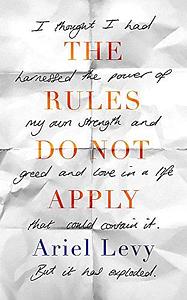Take a photo of a barcode or cover
This memoir was an effortless read. After all Levy went through, it was interesting to read about events in a detached manner. Her writing is excellent, though, and all the life drama had me hooked.
adventurous
emotional
hopeful
inspiring
reflective
sad
fast-paced
A memoir of Levy’s life falling apart – losing her unborn baby, partner and house within a short period of time – and what led her to that point. The book was in part inspired by her devastating and beautiful essay that appeared in the New Yorker, “Thanksgiving in Mongolia.” That essay is maybe the only thing she had to write about that period in her life; this book doesn’t illuminate more, in terms of insight and emotional depth. The book was completely gripping, true, (I read it in an afternoon), but I think the rush to get a book out into the world (presumably riding on the success of the New Yorker essay) forced Levy into a narrative that wasn't necessarily there, trying to shape the outlines of her life, from childhood into the present, into a tidy story that would be satisfying to a mass audience. The issues she faced and had to reckon with are so big and complicated, but the writing itself doesn’t manifest questions or grief happening. I was also troubled with her casting her miscarriage as a sort of divine punishment for putting off motherhood, and her unexamined privilege manifest throughout (surprising given the empathy and insight she shows in reporting on other people, particularly women), as well as her unexamined thoughts on her own bisexuality and perspective on gender (again, surprising given how much she writes about these subjects).
Her writing is genuinely exquisite and compulsively readable, with beautiful word choices. That she is a talented writer is not in question. She doesn't have to be likable and has fully opened herself up to judgement, however in a memoir meant to question her own choices, she doesn't seem to do much true examination of her motives. I found it incredibly problematic that that she was still referring to her former (trans) lover as she or glossing over in a sentence or two about the cushiony pillow of her privilege, as if that didn't play a major part in the outcome of her story. Also, ending her story in a marriage plot trope really lost much of my goodwill towards the story.
Much better than expected, mostly because I was confusing this author with Ariel Leve, whose memoir I recently read.
Ariel Levy has been through the mill. Actually, she's been milled, ground up, beaten into biscuit-dom, chewed, swallowed, egested, and still, somehow, managed to go on.
It is not a spoiler to say that during the course of this memoir she loses a child, a spouse, and a home. I think measuring tragedies against one another a fool's occupation, but, I'm something of a fool, and I think the loss of a child is one of the most devastating sufferings one can endure --- if, endure it one can. There is no coming back to who you were before your child was ripped from your reality; you are forever changed and forever measuring the loss, and, from my experience talking to those who've lost a child, forever numbed to happiness and on guard against loss in a way you were not before the tragedy.
To lose your mate as well, to have to surrender one's home, all on top of the loss of your child --- how do you survive? Ariel Levy, I suspect, manages to continue living by putting words in order, one after another, in ways that make sense and have shape --- logic and form and reason that are lacking in her real life, because, there is no way to make sense or find form in the loss of a child. No way.
So, she wrote this book. She manages to convey much of the horror but it is never done in a weepy-poor-me singing the blues sort of style. She is a successful reporter/profiler (she's worked at both New York Magazine and The New Yorker) and she lays out the story --- her story --- in artful prose, swiftly, not dwelling on the ache and the pain, but, rather, illustrating it, conveying it in reasoned but moving prose. This is a very short and quick book, almost a long-form article, which I read in one sitting.
Any longer would likely have lost me because there is so much pain here. But, if Ariel Levy can write this well about her own life, I have been encouraged to start searching for her profiles and reportage on the lives of others.
It is not a spoiler to say that during the course of this memoir she loses a child, a spouse, and a home. I think measuring tragedies against one another a fool's occupation, but, I'm something of a fool, and I think the loss of a child is one of the most devastating sufferings one can endure --- if, endure it one can. There is no coming back to who you were before your child was ripped from your reality; you are forever changed and forever measuring the loss, and, from my experience talking to those who've lost a child, forever numbed to happiness and on guard against loss in a way you were not before the tragedy.
To lose your mate as well, to have to surrender one's home, all on top of the loss of your child --- how do you survive? Ariel Levy, I suspect, manages to continue living by putting words in order, one after another, in ways that make sense and have shape --- logic and form and reason that are lacking in her real life, because, there is no way to make sense or find form in the loss of a child. No way.
So, she wrote this book. She manages to convey much of the horror but it is never done in a weepy-poor-me singing the blues sort of style. She is a successful reporter/profiler (she's worked at both New York Magazine and The New Yorker) and she lays out the story --- her story --- in artful prose, swiftly, not dwelling on the ache and the pain, but, rather, illustrating it, conveying it in reasoned but moving prose. This is a very short and quick book, almost a long-form article, which I read in one sitting.
Any longer would likely have lost me because there is so much pain here. But, if Ariel Levy can write this well about her own life, I have been encouraged to start searching for her profiles and reportage on the lives of others.
I thought this book was beautiful and exceptionally written, but I felt very uncomfortable reading her descriptions of her (trans) ex, she fails to examine her privilege, and I thought the last few chapters were a mess. I've read Levy's work in The New Yorker and I never skip over her pieces, so I was really excited to read more about her. This book shows her vulnerability and is filled with poignant, beautiful lines, but the problems were problematic enough to make it 3.5 stars rounded to 4 rather than the 5-star all-star I thought it would be when I started reading it. Still, it's worthwhile and a pretty quick read for a memoir.
I don't read a lot of memoirs and this book has me thinking I should do it more often. Relatable, beautifully written and strikingly tragic. 4.5 stars.



